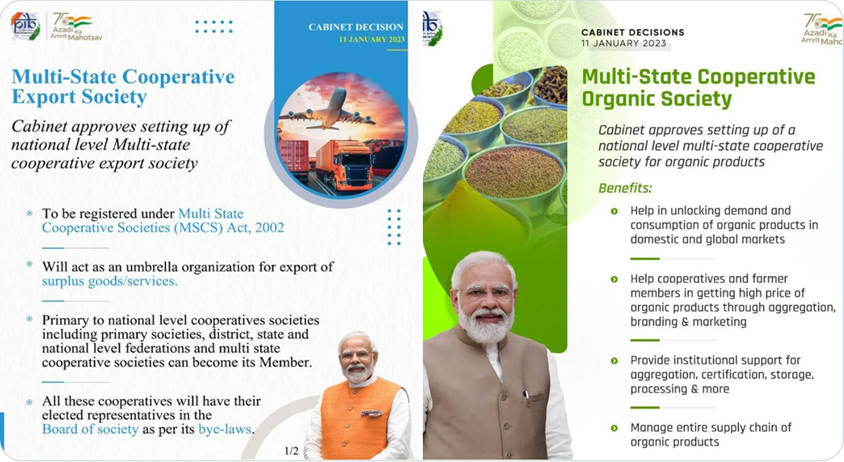Why in News?
- The Union Cabinet recently approved setting up of 3 new cooperative bodies - national multi-state cooperative export society, national multi-state cooperative organic society and national multi-state cooperative seed society, under the MSCS Act, 2002.
What’s in today’s article?
- How are Cooperatives Defined in India?
- What is the History of India’s Cooperative Movement?
- What is the Regulatory Framework for the MSCSs in India?
- News Summary with respect to 3 New Cooperative Bodies
How are Cooperatives Defined in India?
- According to the International Cooperative Alliance (ICA), cooperatives are people-centred enterprises jointly owned and democratically controlled by and for their members to realise their common socio-economic-cultural needs and aspirations.
- According to the Article 43B of the Indian Constitution inserted by the 97th Amendment (2011), states shall endeavour to promote voluntary formation, autonomous functioning, democratic control and professional management of cooperative societies.
- Cooperatives in India range from those providing credit to those producing, procuring, or marketing products like fertilisers, milk, sugar, and fish. For example, Gujarat’s Amul is a highly profitable dairy cooperative.
- According to the Union Ministry of Cooperation (created in 2021, whose goals were previously looked after by the Ministry of Agriculture), there are about 50 lakh cooperatives, which have around 29 crore members mainly from rural areas.
What is the History of India’s Cooperative Movement?
- India’s cooperative movement originated in the agriculture and related sectors as a means for farmers to pool their resources to prevent exploitation by money lenders.
- India’s cooperative movement was formalised at the end of the 19th century, inspired by the German model of agricultural credit banks.
- In 1904, the British government in India enacted the Cooperative Credit Societies Act and the administrative reforms in 1919 transferred cooperatives to provincial control.
- After Independence, the framers of the Constitution placed cooperatives in the State list of the Schedule VII of the Indian Constitution. Hence, States made their own laws to regulate cooperatives within their jurisdiction.
What is the Regulatory Framework for the MSCSs in India?
- These are societies that have operations in more than one state. For example, a farmer-producers organisation which procures grains from farmers from multiple States.
- In 1984, the MSCS Act (amended in 2002) was enacted by Parliament to consolidate different laws at the central level.
- MSCSs are registered under the MSCS Act 2002, and their regulation lies with the Central Registrar.
- The board of directors are from all the States these collectives operate in and control all finances and administration function.
- There are close to 1,500 MSCSs registered in India, the highest number being in Maharashtra.
- A large number of MSCSs are credit societies, while agro-based societies, dairies and banks are also sizeable in number.
- According to the studies, as government and legislative control over cooperatives grew through time (compromising their independence and autonomous character), so did reports of mismanagement and corruption.
- The Centre introduced the MSCS (Amendment) Bill, 2022, seeking to amend the 2002 law for more “transparency” and increase the “ease of doing business”.
News Summary with respect to 3 New Cooperative Bodies:

- The national multi-state cooperative export society: Increased cooperative product export will encourage "Make in India," leading to Atma Nirbhar Bharat and creating additional employment.
- The national multi-state cooperative organic society: It will help in unlocking demand and consumption potential of organic products in domestic as well as global markets, ultimately helping their farmer members in getting benefits of high price of organic products.
- The national multi-state cooperative seed society:
- It will act as an apex organisation -
- For production, procurement, processing, branding, labelling, packaging, storage, marketing and distribution of quality seeds,
- For strategic R&D,
- To develop a system for preservation and promotion of indigenous natural seeds.
- The proposed society will help to increase the seed replacement rate, varietal replacement rate, ensuring the role of farmers in quality seed cultivation and seed variety trials.









